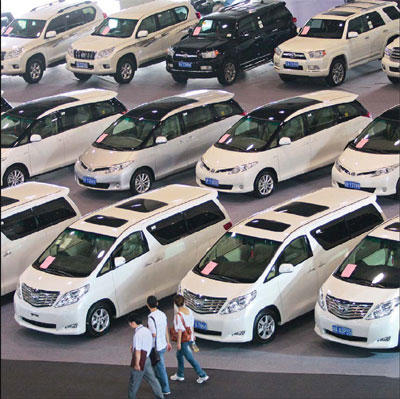Rolling into new terrain
Updated: 2011-12-30 07:41
By Wang Chao (China Daily)
|
||||||||
|
Minivans are displayed at a recent rental and leasing industry expo in Jiangsu province. [Provided to China Daily] |
Investors are splashing top dollar into the car rental industry
Chinese New Year is less than a month away and the biggest human migration in the world will soon send chaos throughout China's clogged railways, highways and flight paths. Domestic airlines and railways were the dominant modes of transportation for approximately 2.85 billion trips in 2011 made by Chinese travelers who were criss-crossing the nation in the hopes of seeing their loved ones in their hometowns. But recently in residential communities, subways and bus stops, advertisements are bombarding passers-by with strikingly cheap offers, often with slogans that read "Drive home instead of being packed in a train".
|
||||
This year and in the foreseeable future, transit analysts and business experts both agree that the car rental industry will grow into a new method of transportation for China. Infused with new capital and expectations, the car rental industry is going to take off quickly, according to analysts.
Over the past three years, the largest auto market in the world has seen its car rental industry grow annually by nearly 20 percent, according to the China Taxicab and Livery Association.
But car rentals were not available until the late '90s in China, when Chinese taxi companies rented cars for foreign tourists. The industry is still growing, say many experts and investors, and though there has been a recent infusion of cash from investors, there are also many obstacles to overcome.
The car rental market first began showing signs of growth in 2009, when the retail auto market sold 13.76 million motor vehicles made in China, overtaking the United States in volume production.
Soon, investors were knocking on the door. In August 2010, Goldman Sachs pumped $70 million into eHi Car Rental, based in Shanghai.
A month later, Legend Holdings, a Chinese investment holdings company in IT, investment and real estate, spent 1.2 billion yuan to acquire a 50-percent stake in China Auto Rental, based in Beijing.
Then in November 2010, Mitsubishi Corp invested $20 million for a joint-venture with Cheeyou Car Rental in Hangzhou, East China's Zhejiang province.
Car rental companies, flooded with new cash, began buying more cars and setting up more offices across China. Based on data from Roland Berger Strategy Consultants, there are around 10,000 car rental companies in China with half of them located in first-tier cities, such as Beijing, Shanghai, Guangzhou and Shenzhen.
In July, the consulting firm released an annual revenue forecast of $6 billion by 2015 with a supply of 430,000 cars for rent. There are currently 50,000 cars for rent, according to the China Taxicab Livery Association; in the US, there are 1.7 million, according to Auto Rental News, a US-based magazine that covers the car and truck rental industry.
But then there are the surprising statistics from both Roland Berger and the association. Each rental car company on average only owns 20 cars with the top five rental companies seizing 11 percent market share of the industry.
In contrast, the top seven rental companies in the US have a 95-percent market share.
For another comparison, note that the world's largest car rental company, Hertz, owns a fleet of 500,000; the biggest fleet in China, owned by China Auto Rental, is 25,000.
Currently, the top Chinese companies are spread out over China: Topone Car Rental, based in Shenzhen, controls the market in southern China; eHi has a hold on eastern China; and China Auto Rental claims it has networks across the country.
Officials from each of these companies said they have added many offices since 2009. Even Hertz, a leading rental brand in the US, has increased its number of offices from two to five this year in China.













